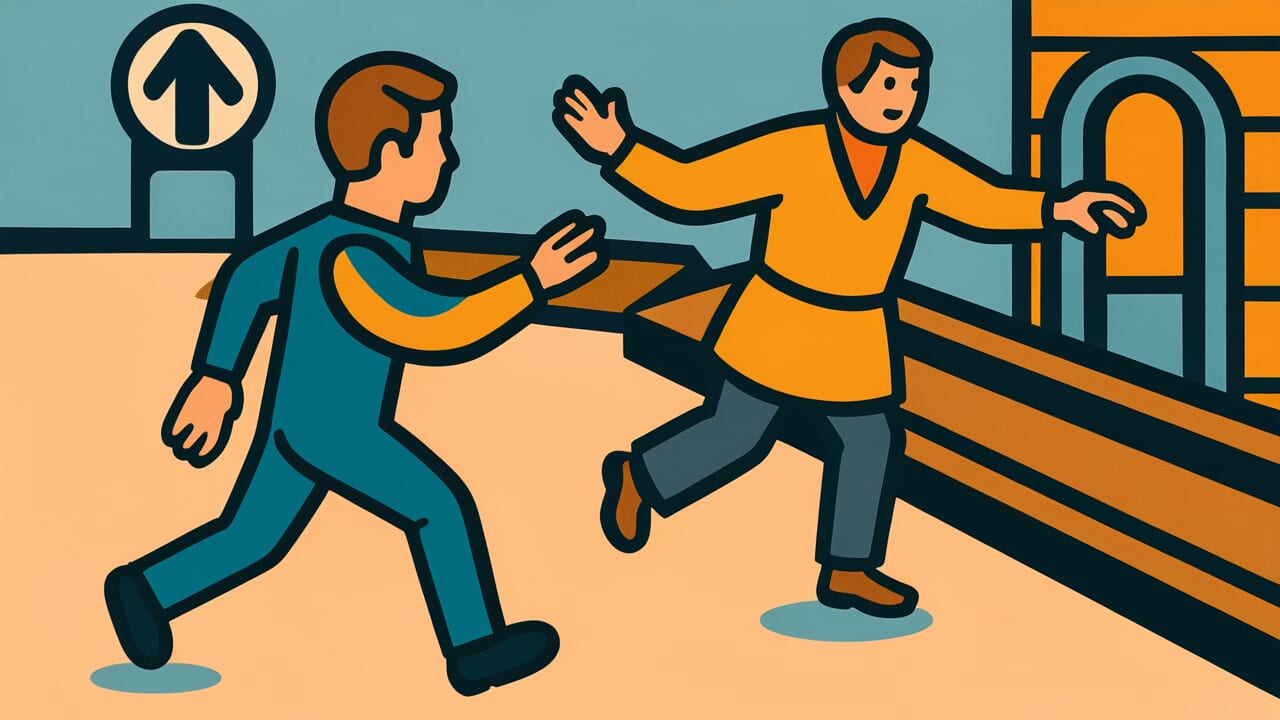How to Read “Without advancing an inch, retreat a foot”
Sun wo susumazu shite shaku wo shirizoku
Meaning of “Without advancing an inch, retreat a foot”
This proverb describes a situation where you cannot move forward at all. Instead, you end up falling far behind.
It means your efforts not only fail to produce results, but actually make things worse. The situation deteriorates despite your attempts to improve it.
People use this saying when plans or projects fail to progress as expected. Losses keep piling up instead.
It also applies when trying to solve a problem makes it even worse. Or when personal efforts backfire and leave you in a worse state than before.
The expression emphasizes a double difficulty. You face not just stagnation, but actual regression.
The contrast between “sun” (inch) and “shaku” (foot) is striking. You cannot advance even a tiny bit, yet you retreat ten times that distance.
This situation can happen in modern life too. Business ventures, studying, and relationships all carry this risk.
When you choose the wrong direction or misjudge timing, you can fall into this trap. The proverb warns us to be careful.
Origin and Etymology
No clear historical records document the exact origin of this proverb. However, we can learn much from examining its structure.
The contrast between “sun” and “shaku” is particularly interesting. In the traditional measurement system from China, one shaku equals ten sun.
This means you retreat ten times the distance you tried to advance. The imbalance is extreme and deliberate.
Ancient Chinese philosophy likely influenced this expression. The concept of “advance and retreat” appears throughout Confucian and military texts.
These classics repeatedly stress the importance of balance and timing. They warn that forcing advancement often leads to major setbacks.
Japanese proverbs frequently use numerical contrasts. “Hear one, know ten” and “A thousand-mile journey begins with one step” are examples.
Using specific numbers makes the lesson more vivid and memorable. The contrast creates a stronger impression.
“Without advancing an inch, retreat a foot” follows this tradition perfectly. The numerical comparison paints a clear picture of the unfortunate situation.
Usage Examples
- We tried a new sales strategy, but it was “without advancing an inch, retreat a foot” – we ended up losing customers
- I changed my study method, but “without advancing an inch, retreat a foot” – my grades actually dropped
Universal Wisdom
“Without advancing an inch, retreat a foot” reveals one of life’s harshest realities. Effort does not always bring rewards.
Sometimes well-intentioned actions produce terrible results. This is a cruel truth we must accept.
Why does this happen? Because humans cannot always make perfect judgments.
We decide with limited information. We act toward an uncertain future. We can misjudge direction or timing.
Sometimes our good intentions trigger unexpected chain reactions. The situation spirals out of control.
This proverb has endured because it captures a universal form of failure. Everyone experiences the pain of backfiring efforts.
The frustration of being pulled backward while trying to move forward is timeless. These feelings transcend culture and era.
But the proverb also serves as a warning. Unplanned advancement, ignoring circumstances, and hasty decisions from anxiety all lead to major setbacks.
Our ancestors understood this deeply. True progress requires caution and discernment. This wisdom about human nature remains valuable today.
When AI Hears This
Small continuous investments leading to huge losses can be explained through expected value miscalculation. Consider pulling a 100-yen gacha ten times without winning.
You think “I spent 1000 yen already, so the next one must hit.” But probability resets each time. Past investment has zero impact on future expected value.
This is called the sunk cost fallacy. Game theory’s backward induction offers deeper insight.
This method calculates optimal actions by working backward from the future. You first calculate total potential loss, then decide whether to quit now.
Professional poker players completely ignore money already in the pot. They decide to fold based only on future investment and win probability.
Investment markets have an iron rule: “Set your stop-loss line in advance.” This follows the same principle.
When stock prices drop, thinking “I’ve lost this much, so I’ll hold until I recover” can be fatal. Prices may plunge further.
The structure where refusing to accept a small loss leads to catastrophic ruin can be mathematically proven. Human brains evolved to feel past investments as “wasteful.”
But rational judgment treats the past as irrelevant. This psychological bias creates the trap of small advances and large retreats.
Lessons for Today
This proverb teaches modern people the importance of discernment before action. Do you ever rush into things from anxiety or impatience?
Modern society overflows with messages like “Just take action” and “Don’t fear failure.” Action is certainly important.
But this proverb reveals another truth. Moving in the wrong direction produces worse results than doing nothing.
That is why we need courage to pause and think. Can you accurately assess your current situation?
How will your actions affect those around you? Is the timing right? Asking these questions is not cowardice.
It is wise caution that prevents major setbacks. If you find yourself in a “without advancing an inch, retreat a foot” situation, that is a signal to change direction.
Do not keep doing the same thing. Stop and reconsider your strategy.
This way, you can take a truly solid step forward next time. For your efforts to bear fruit, sometimes you need the courage to stand still.



Comments